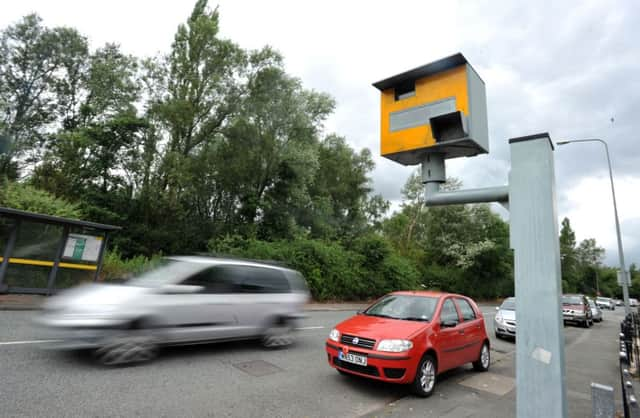DERBYSHIRE: Motorists pay a £2m penalty


Between 2008 and 2013, motorists splashed out a total of £2,272,200 in fines after being caught speeding on the county’s roads.
Road safety groups have stressed the importance of speed cameras – but critics branded the controversial devices a “cash cow”.
Advertisement
Hide AdAdvertisement
Hide AdThe cameras are operated by Derbyshire road safety partnership, which is made up of a number of agencies including Derbyshire County Council and Derbyshire police. Any revenue from speed cameras goes to central Government coffers.
A spokesman for the partnership said: “Reducing road deaths and injuries is our top priority.
“Safety cameras have been in operation across the county since 1994. Since then the number of people killed or seriously injured has dropped by 40 per cent on routes where cameras are in use.”
However, Joanthan Isaby, political director of campaign group the Taxpayers’ Alliance, said: “Large numbers of drivers feel unfairly targeted by speed cameras which are far too often a means of using already hard-pressed motorists as a cash cow.
Advertisement
Hide AdAdvertisement
Hide Ad“The authorities should concentrate on genuinely making the roads safer, rather than merely setting up cameras with the aim of raking in as much cash as possible.”
The road safety partnership currently has a total of 12 wet film cameras, which are rotated between 113 yellow roadside boxes across the county based on accident figures. Last month, council bosses agreed to invest in ten digital cameras and upgrade 70 of the county’s boxes so they are capable of housing the new hi-tech devices – at a cost of £1m.
The road safety partnership spokesman said: “We’ve decided to make the switch because we hope it will allow us to make savings in the long term.
“As more areas make the switch, it’s going to get harder and more expensive to get replacement parts and servicing for those with film-based systems.” The spokesman added: “The digital system means that staff who view the photo evidence to decide whether or not a penalty notice should be issued will be able to download images from a camera while still in their office instead of travelling to the site to collect film.”
Your views
Advertisement
Hide AdAdvertisement
Hide AdOn our Facebook and Twitter accounts, we asked readers if they think speed cameras are a money-making racket or important for road safety.
Tracy Skill said: “If you don’t speed you don’t get fined. Simple!”
Jessica Penney-atkinson said: “People speed where there aren’t any cameras and slow down when they come to
one!”
Ian Hewitt said: “All monies raised ought to go towards repairing our roads and making them safer and it clearly
isn’t!”
Advertisement
Hide AdAdvertisement
Hide AdPaul Walker said: “I could understand it if they put them outside schools – but they put them on roads where there is a possibility that one may increase their speed.”
Dave Longden said: “Mobile cameras instead of static ones are more effective.”
David Martin said: “I don’t agree with speed cameras.
However, I saw a father
defending them after his 14-year-old daughter had been killed by a speeding driver and can understand how he must be feeling and why he would want them.”
Tim Holloway said: “Surely the purpose of speed cameras is to prevent speeding. If they generate £2m then they’re not working in a lot of cases.”
Fact box
Advertisement
Hide AdAdvertisement
Hide AdIn Derbyshire, both permanent and mobile cameras are used to detect motoring offences.
Two types of cameras are used on roads across Derbyshire:
Gatso cameras use a radar to measure the speed of vehicles and are only able to take rear facing photography.
Truvelo cameras use sensors embedded in the road to measure the speed of vehicles. They can prove who was driving the vehicle because they can take front and rear facing photography.
Mobile cameras work in a similar way to a video camera and are usually operated through the window of a vehicle.
Advertisement
Hide AdAdvertisement
Hide AdSpecs cameras measure the average vehicle speed between two fixed points. They are used along the Derbyshire stretches of the M1 motorway.
Cameras are not the only devices used to gather evidence of speeding – police may use hand-held laser guns and in-car computers to catch motorists flouting the speed limit.